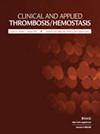Risk Factors Associated With Exclusion of Obese Patients Ischemic Stroke With a History of Smoking From Thrombolysis Therapy
IF 2
4区 医学
Q2 HEMATOLOGY
引用次数: 0
Abstract
The objective of this study is to determine risk factors that may contribute to exclusion decision from recombinant tissue plasminogen activator (rtPA) in patients with acute ischemic stroke (AIS) with a combined current or history of smoking and obesity. This study was conducted on data from 5469 patients with AIS collected from a regional stroke registry. Risk factors associated with inclusion or exclusion from rtPA were determined using multivariate logistic regression analysis. The adjusted odds ratios and 95% confidence interval for each risk factor were used to predict the increasing odds of an association of a specific risk factor with exclusion from rtPA. In the adjusted analysis, obese patients with AIS with a history of smoking (current and previous) excluded from rtPA were more likely to present with carotid artery stenosis (OR = 0.069, 95% CI 0.011-0.442), diabetes (OR = 0.604, 95% CI 0.366-0.997), higher total cholesterol (OR = 0.975, 95% CI 0.956-0.995), and history of alcohol use (OR = 0.438, 95% CI 0.232-0.828). Higher NIHSS score (OR = 1.051, 95% CI 1.017-1.086), higher triglycerides (OR = 1.004, 95% CI 1.001-1.006), and higher high-density lipoprotein (OR = 1.028, 95% CI 1.000-1.057) were associated with the inclusion for rtPA. Our findings reveal specific risk factors that contribute to the exclusion of patients with AIS with a combined effect of smoking and obesity from rtPA. These findings suggest the need to develop management strategies to improve the use of rtPA for obese patients with AIS with a history of smoking.将有吸烟史的肥胖缺血性脑卒中患者排除在溶栓治疗之外的相关风险因素
本研究的目的是确定对合并有吸烟和肥胖的急性缺血性卒中(AIS)患者做出排除重组组织纤溶酶原激活剂(rtPA)决定的风险因素。这项研究的数据来自一个地区性中风登记处收集的 5469 名急性缺血性中风(AIS)患者。采用多变量逻辑回归分析确定了纳入或排除使用 rtPA 的相关风险因素。每个风险因素的调整后几率比和 95% 的置信区间用于预测特定风险因素与被排除使用 rtPA 相关性的增加几率。在调整后的分析中,被排除在 rtPA 之外的有吸烟史(现在和以前)的肥胖 AIS 患者更有可能出现颈动脉狭窄(OR = 0.069,95% CI 0.011-0.442)、糖尿病(OR = 0.604,95% CI 0.366-0.997)、总胆固醇较高(OR = 0.975,95% CI 0.956-0.995)和饮酒史(OR = 0.438,95% CI 0.232-0.828)。较高的 NIHSS 评分(OR = 1.051,95% CI 1.017-1.086)、较高的甘油三酯(OR = 1.004,95% CI 1.001-1.006)和较高的高密度脂蛋白(OR = 1.028,95% CI 1.000-1.057)与纳入 rtPA 相关。我们的研究结果揭示了一些特殊的风险因素,这些因素导致吸烟和肥胖共同作用的 AIS 患者被排除在 rtPA 治疗范围之外。这些研究结果表明,有必要制定管理策略,以改善对有吸烟史的肥胖 AIS 患者使用 rtPA 的情况。
本文章由计算机程序翻译,如有差异,请以英文原文为准。
求助全文
约1分钟内获得全文
求助全文
来源期刊
CiteScore
4.40
自引率
3.40%
发文量
150
审稿时长
2 months
期刊介绍:
CATH is a peer-reviewed bi-monthly journal that addresses the practical clinical and laboratory issues involved in managing bleeding and clotting disorders, especially those related to thrombosis, hemostasis, and vascular disorders. CATH covers clinical trials, studies on etiology, pathophysiology, diagnosis and treatment of thrombohemorrhagic disorders.

 求助内容:
求助内容: 应助结果提醒方式:
应助结果提醒方式:


